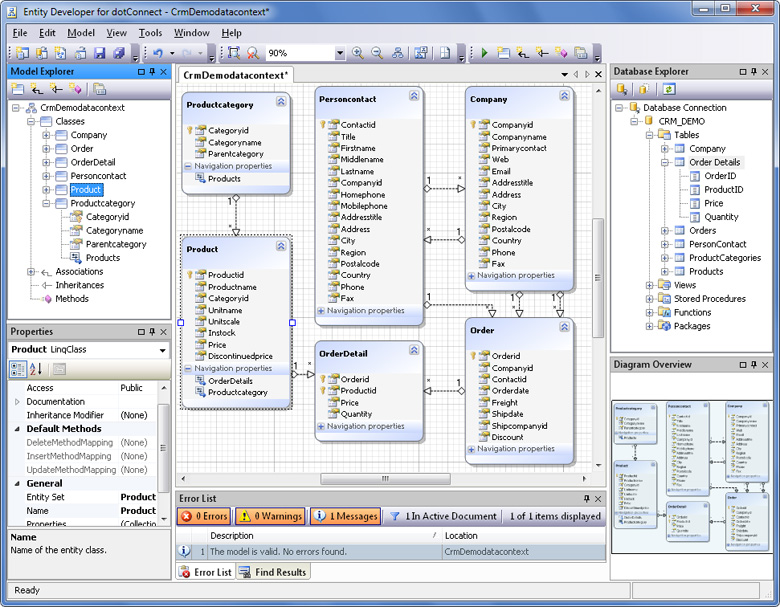LinqConnect is the fast and lightweight ORM solution, which is closely compatible to Microsoft LINQ to SQL and contains its own advanced features, such as complex type support, advanced data fetching options, configurable compiled query caching, and others. LinqConnect is integrated into dotConnect for Oracle, dotConnect for MySQL, dotConnect for PostgreSQL, and dotConnect for SQLite.
LinqConnect includes run time assemblies to be used directly by your code, and a visual tool - Entity Developer, which helps you build object-relational model from scratch or by reverse-engineering your database.
The article consists of the following sections:
What is LINQ?
LINQ stands for Language-Integrated Query, which means that data retrieval is no longer a separate language. The LINQ engine allows .NET applications to connect to databases without bothering much about columns and rows. The data you receive is automatically formed as objects ready to use by your business logic.
LINQ to Relational Data may be thought of as an object-relational mapping (ORM) tool. The type-safe LINQ queries get compiled into MSIL on the fly, and the query clauses are translated into SQL and sent to Oracle server for execution. This makes your data access layer safer, faster, and greatly more convenient to design.
Why Use LinqConnect?
Let's briefly enumerate just four main reasons to use LinqConnect in your applications:
- Development time: it is really faster, having stripped off better part of the mundane work.
- Maintenance time and effort: greatly designed application does not need as much maintenance as a poorly written one.
- Performance: high enough without lots of efforts on optimizing your code. Even higher if you bother to do so.
- Security: LINQ to SQL enforces good application architecture, which leaves less room for design vulnerabilities.
- New Platform Support: LinqConnect includes .NET Standard compatible assemblies (available via NuGet packages) and supports .NET Core 1.1, 2.0, and 3.0.
Key Features
- Interchangeable with Microsoft LINQ to SQL
- Wide support for LINQ capabilities
- Wide database support
- High performance
- Visual schema modelling with Entity Developer
- Visual Studio integration
- POCO classes used (no need to use a common base class)
- Full CRUD (Create, Retrieve, Update, Delete) support
- Batch updates
- PLINQ support
- ASP.NET Dynamic Data support
- Change tracking support
- Inheritance mapping (Table per hierarchy, Table per type)
- Metadata mapping
- Well-thought predefined templates for class generation
- Custom templates for generated classes
- Visual Studio debugger visualizer for DataQuery objects
- Query logging
- dbMonitor support
Visual Model Creation
LinqConnect includes a powerful visual tool for creating entity model that describes your business objects and their mapping to the database. You can design the model from scratch or reverse-engineer an existing database, in which case you will have the classes and the relations with just several clicks.

Entity Developer generates the classes in C# or Visual Basic. These classes (the model) is used by your application code.
Feature Information
Requirements
LinqConnect requires .NET Framework 3.5 or later installed on the computer.
Documentation And Samples
LinqConnect includes documentation that covers LinqConnect usage and run time reference.
For a quick start with the technology you can use LinqConnect Tutorial.
There are three demo projects in C# and Visual Basic that can help you start using LinqConnect. Use Start menu to open them.
Discussion Forum
LinqConnect has a dedicated forum where you can get help on using the technology within Devart dotConnects.
See Also
dotConnect LINQ to SQL Documentation | LINQ to Oracle Tutorial | ADO.NET Entity Framework Support